George Edwin Bissell
George Edwin Bissell (February 16, 1839 – August 30, 1920) was an American sculptor.
George Edwin Bissell | |
|---|---|
| Born | February 16, 1839 |
| Died | August 30, 1920 (aged 81) |
| Nationality | American |
| Known for | Sculpture |
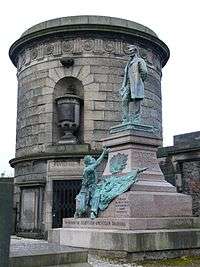
Biography
Bissell was born New Preston, Connecticut, the son of a quarryman and marble-cutter. During the American Civil War he served as a private in the 23rd Connecticut Volunteers in the Department of the Gulf (1862–1863), and on being mustered out became acting assistant paymaster in the South Atlantic Squadron. At the close of the war he joined his father's marble business in Poughkeepsie, New York.[1]
He studied the art of sculpture abroad in 1875–1876, and lived much in Paris during the years 1883–1896, with occasional visits to America.[1] Bissell also created smaller works, such as a bust of President Abraham Lincoln as well as a larger statue of the president.[2]
Selected works
- Frederic de Peyster, New York Historical Society, New York City, ca. 1875.
- Chatfield Monument, Riverside Cemetery, Waterbury, Connecticut, ca. 1880.
- General Horatio Gates, Saratoga Battle Monument, Saratoga, New York, 1885–86.[3]
- Sam Sloan, Lackawanna Ferry Terminal, Hoboken, New Jersey, 1889.
- Statue of John Watts, depicting the New York politician of the same name, Trinity Church Cemetery, 1890.
- Bas-relief panel of Robert Burns and Highland Mary, on pedestal of George Anderson Lawson's Statue of Robert Burns, Ayr, Scotland, 1891.
- Colonel Abraham de Peyster, New York Historical Society, 1896. This statue stood in Bowling Green Park from 1896 to 1972, and in Hanover Square from 1976 to 2004.
- Statue of Chester A. Arthur, Madison Square, New York City, 1898–99.
- Abraham Lincoln, Lightner Museum, St. Augustine, Florida, 1899.
- Chancellor James Kent, Library of Congress, Washington, D.C., ca. 1899.
Civil War monuments
- Union Soldier, Civil War Monument, Town Green, Colchester, Connecticut, 1875.
- Soldiers' Monument, The Green, Waterbury, Connecticut, 1882–85.[4]
- Soldiers' Monument, Soldiers' Monument Park, Winsted, Connecticut, 1887–90.[5]
- Columbia, atop Soldiers' Monument, Civil War Memorial Park, Salisbury, Connecticut, 1891.[6]
- Lincoln Memorial (In Memory of Scottish-American Soldiers), Old Calton Burying Ground, Edinburgh, Scotland, 1893.
- Bust of Admiral John A. B. Dahlgren, Smith Memorial Arch, Fairmount Park, Philadelphia, Pennsylvania, 1901–04.
- Abraham Lincoln, Lincoln Park, Clermont, Iowa, 1902.[7] A replica of Bissell's statue in Edinburgh, Scotland.
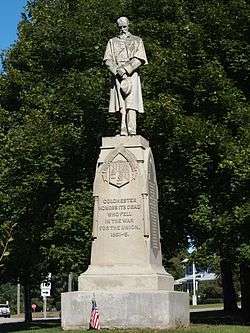 Civil War Monument (1875), Colchester, Connecticut.
Civil War Monument (1875), Colchester, Connecticut.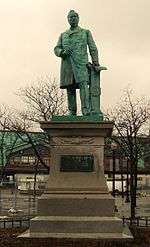 Sam Sloan (1889), Lackawanna Ferry Terminal, Hoboken, New Jersey.
Sam Sloan (1889), Lackawanna Ferry Terminal, Hoboken, New Jersey.- John Watts (1890), Trinity Church (New York City).
 Abraham de Peyster (1896), New York Historical Society, New York City.
Abraham de Peyster (1896), New York Historical Society, New York City.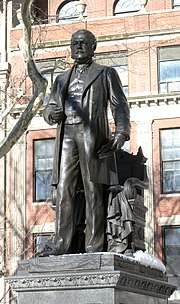 Chester A. Arthur (1898–99), Madison Square, New York City.
Chester A. Arthur (1898–99), Madison Square, New York City. Chancellor James Kent (c. 1899), Library of Congress, Washington, D.C.
Chancellor James Kent (c. 1899), Library of Congress, Washington, D.C.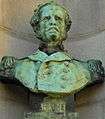 Bust of Admiral John A. B. Dahlgren (1901–04), Smith Memorial Arch, Fairmount Park, Philadelphia, Pennsylvania.
Bust of Admiral John A. B. Dahlgren (1901–04), Smith Memorial Arch, Fairmount Park, Philadelphia, Pennsylvania.
Other sculptures
- Booth monument, Riverside Cemetery, Waterbury, Connecticut (1878).
- N.J. Welton monument, Riverside Cemetery, Waterbury, Connecticut (1880).
References
- Chisholm 1911.
- "George Edwin Bissell at auction". Fine Art 2007. Rago Arts and Auction Center. Archived from the original on 2011-07-15.
- General Gates from Flickr.
- Waterbury Soldiers' Monument from Flickr.
- Winsted Soldiers' Monument from Flickr.
- Salisbury Soldiers' Monument from Flickr
- Clermont Lincoln from AbrahamLincolnOnline.
- Attribution

- Opitz, Glenn, B.,editor, Mantle Fielding's Dictionary of American Painters, Sculptors & Engravers, Apollo Books, Poughkeepsie, NY 1986
External links
| Wikimedia Commons has media related to George Edwin Bissell. |